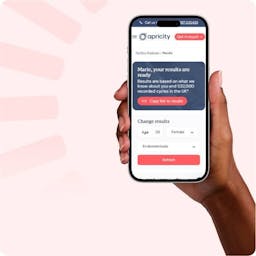Call us today on +44 7897 035438
The step by step process of IVF with donor eggs
In this step-by-step guide to the donor egg IVF process, we explain each stage from registering interest through to taking a pregnancy test.

In vitro fertilisation (IVF) is an assisted reproductive technology that involves the fertilisation of a human egg with sperm outside of the body in a laboratory. People undergo IVF for a multitude of reasons. More than 1.3 million IVF cycles have taken place since 1991 in the UK alone.
IVF with donor eggs is a fertility treatment option where a woman uses donated eggs from another woman in the process. This method is particularly beneficial for individuals or couples facing challenges related to egg quality, diminished ovarian reserve, or genetic conditions that they wish to avoid passing on to their children. It is also a viable option for same-sex male couples or women who cannot carry a pregnancy who are using a surrogate. In 2019, sperm, egg or embryo donation led to more than 4,100 births, accounting for 1 in 170 of all births and for nearly 1 in 6 births using IVF in the UK.
But how does IVF with donor eggs work? In this guide, we walk through the donor egg IVF timeline, discussing each stage in the process starting with initial contact with a clinic through to taking a pregnancy test.

Enquiry
An IVF journey starts with registering your interest in IVF with donor eggs. During your initial enquiry call with an Apricity fertility advisor, they’ll spend time talking you through the process of IVF using donor eggs and answer any questions that you have. Our egg donation fertility advisors have long experience working in egg donation and are passionate about it.
Fertility tests and consultation
Comprehensive fertility testing and a consultation follow your enquiry. As a virtual fertility clinic, we organise as much of your testing at home as possible. We’ll send you clinical-grade diagnostic kits directly to your door so that you can take the tests in the privacy and comfort of your own home. The finger prick blood test allows us to assess your thyroid function and check your ovarian reserve. Once you’ve done it, you simply return your sample by post.
You’ll also require an internal ultrasound to assess your uterus, endometrium, and ovaries. Ultrasounds are carried out at a clinic close to home, thanks to our network of ultrasound clinics across the country.
If you have a male partner, whose sperm will be used to fertilise the donor eggs, they will need to provide a semen sample. This can be done with an at-home kit or by visiting a nearby clinic. The sample is assessed to determine if there are any issues with sperm concentration (number), motility (movement), morphology (size and shape), vitality (percentage of live sperm) and pH level.
You’ll then have a virtual consultation with one of our specialist fertility doctors. During this consultation, you will discuss your fertility history, and review your fertility testing results, and our specialist will make treatment recommendations.
After the consultation, and before your treatment begins, an infectious disease screening which tests for HIV, Hepatitis B, and Hepatitis C takes place. Screening for Rubella is necessary for female patients too.
Counselling
Before any IVF treatment begins, clinics give you the opportunity to receive counselling. Some clinics even require counselling to ensure you receive the right support. Counselling provides a safe, supportive space to explore your thoughts and feelings about undergoing IVF with donor eggs.
Apricity provides unlimited implications counselling for recipients. In addition, we signpost you to valuable sources of information such as the Donor Conception Network and offer all recipients six months access to Paths to Parenthub when they sign up with us to find a donor.

Egg donor matching
Should you decide to go ahead with IVF with donor eggs, the next stage is to match you with an egg donor. The Apricity 1:1 egg donor matching process is incredibly thorough as we take into account not only the physical characteristics but also the jobs, hobbies, interests, values, humour and education of both you and the egg donor.
You’ll receive a wealth of non-identifying information about your matched egg donor. As well as general details and a medical history, we will provide you with their Personal Profile which gives you an insight into who they are as a person, and a childhood photo of the donor.
Our personalised matching is a bespoke service. However, as we don’t have waiting lists and continuously welcome new egg donors, we can match you with a donor in a matter of weeks or sooner, depending on the criteria you have.
Ovarian stimulation
When you have been matched with a donor that you’re happy with, an IVF cycle can begin. Your egg donor will start the ovarian stimulation phase. The primary goal of ovarian stimulation is to induce the ovaries to produce a higher number of mature eggs than would occur in a natural menstrual cycle.
The donor injects fertility medications daily for 8-14 days and has monitoring scans and blood tests every 2-3 days to assess the developing follicles. Once the follicles reach an appropriate size, the egg donor administers a ‘trigger shot’ at a precise time. This hormone triggers the final maturation of the eggs within the follicles.
Donor egg collection
Approximately 36 hours after the trigger shot, your donor will undergo the egg collection process. This is a short procedure, lasting around 20 minutes. The egg donor receives a mild sedative or anaesthesia beforehand to minimise any discomfort. A fertility specialist gently inserts a needle through the vaginal wall and into each ovarian follicle. The needle connects to a suction device, which helps draw the fluid from the follicles, along with the mature eggs. An embryologist then examines the collected fluid in the laboratory to identify and retrieve the mature eggs.

Egg fertilisation
An embryologist fertilises the viable, mature eggs with sperm (either from the recipient's partner, an intended parent, or a sperm donor) in the laboratory. The embryologist will check the eggs after 16-20 hours to determine how many have successfully become embryos. They leave the embryos to culture for up to six days, monitoring them closely throughout to assess their development and quality.
Embryo transfer
Once the embryos have grown, embryo transfer takes place. The timing of the embryo transfer depends on whether it's a fresh or frozen transfer. In a fresh transfer, the selected embryo or embryos are transferred soon after fertilisation, typically on day three or day five after egg collection. For a fresh transfer, the recipient or surrogate will undergo treatment at the same time as the egg donor so that their menstrual cycles become synchronised in preparation.
In a frozen transfer, embryos are cryopreserved (frozen) and transferred in a later menstrual cycle after thawing. The actual transfer procedure is similar for both fresh and frozen transfers. It is a relatively simple outpatient procedure where a fertility specialist places the selected embryos into the uterus using a thin catheter. Ultrasound imaging guides the process.
Post-embryo transfer
After embryo transfer, the recipient should not feel any discomfort and can continue her usual activities, although may want to rest for a brief period. The clinic will usually give her hormonal medication to use, such as progesterone supplements, to support the uterine lining and facilitate embryo implantation.
Pregnancy test
Your clinic will ask you to take a pregnancy test about 10-14 days after the embryo transfer to determine if implantation has occurred. A blood test to confirm pregnancy and assess hCG levels is also commonplace. If successful, the recipient (you or your surrogate) will continue to receive prenatal care to monitor the pregnancy. If the embryo transfer is not successful, your clinic will offer you a follow-up appointment to discuss the IVF cycle and propose the next steps.
Every journey of IVF with donor eggs is unique but Apricity’s care team are here to provide support and guidance throughout the entire process. Through our virtual care clinic, you can reach out to us seven days a week – we’re with you for every step of the journey. To find out more about how IVF with donor eggs works, or to register your interest in finding a donor, speak to an Apricity advisor today.
References

Written by Apricity Team
Helping you stay informedWritten by our group of fertility experts and doctors consultants
Written by our group of fertility experts and doctors consultants
Keep reading
Why Apricity
Preserve Fertility
Fertility Treatments
Egg Donation
Ⓒ Apricity Fertility UK Limited. All rights reserved


